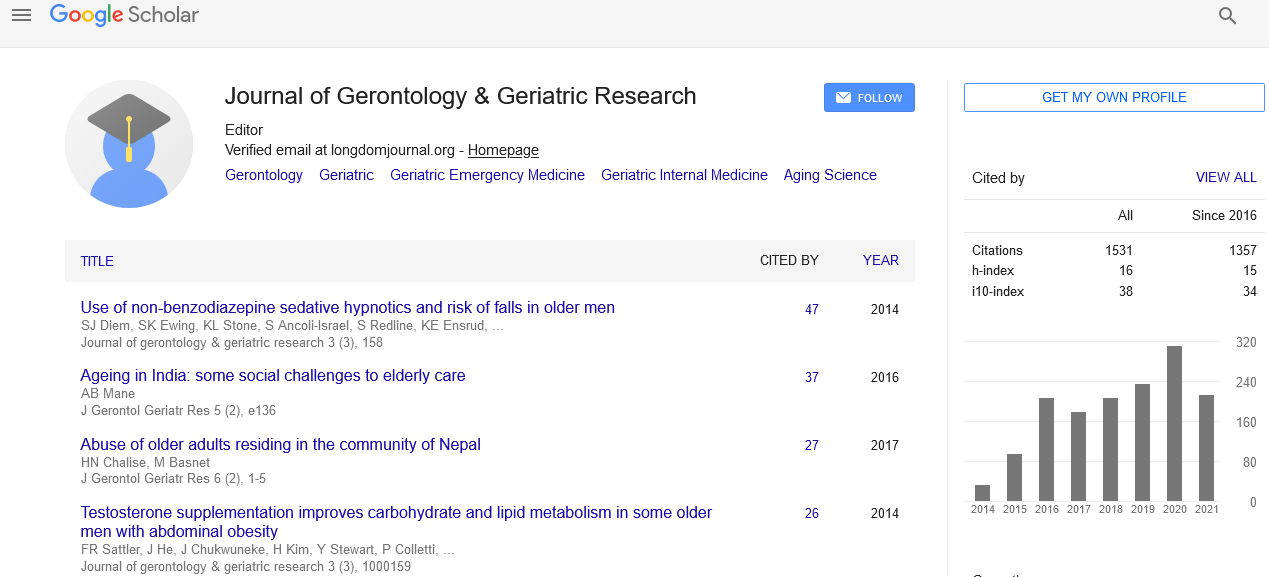PMC/PubMed Indexed Articles
Indexed In
- Open J Gate
- Genamics JournalSeek
- SafetyLit
- RefSeek
- Hamdard University
- EBSCO A-Z
- OCLC- WorldCat
- Publons
- Geneva Foundation for Medical Education and Research
- Euro Pub
- Google Scholar
Useful Links
Share This Page
Journal Flyer

Open Access Journals
- Agri and Aquaculture
- Biochemistry
- Bioinformatics & Systems Biology
- Business & Management
- Chemistry
- Clinical Sciences
- Engineering
- Food & Nutrition
- General Science
- Genetics & Molecular Biology
- Immunology & Microbiology
- Medical Sciences
- Neuroscience & Psychology
- Nursing & Health Care
- Pharmaceutical Sciences
ACTIVE AGING BY AGE, SEX AND YEARS OF EDUCATION IN A SAMPLE OF MEXICAN OLDER ADULTS
2nd International Conference on Aging & Gerontology
June 26-27, 2017 San Diego, CA, USA
Bertha C. Salazar
Universidad Autónoma de Nuevo León, Mexico
Keynote: J Gerontol Geriatr Res
Abstract:
Statement of the Problem: Population aging is considered a successful of humanity by international organizations. But at the same time it is likely that older adults suffer from one more chronic diseases imposing challenges to older adults, families and society. Efforts are needed to maintain older adult�??s health and active as much as possible. The purpose of this paper is to describe active aging according to sex, age and years of school in a sample of Mexican older adults from Matamoros, Mexico. The data are part of a bigger study. Methodology & Theoretical Orientation: A descriptive design was used with 200 older adults. A non-probabilistic sampling was used. Participants were recruited through referrals of principal investigator's university colleagues. It was assured that participants with more than 14 years of education were also recruited to seek for differences by years of school. Active aging was measured by basic and instrumental activities of daily living, Yesavage depression short scale, Pffeifer mental state questionnaire and one question perceived health. Cutoff points were established for each measurement and sum to dichotomize into active aging or not. Additional questions were time spent in physical activities, and as volunteer work. Findings: Most of participants (190; 95%) presented a chronic disease. One hundred two participants qualified in active aging (physical independent, free of depressive symptoms, good mental state and perceived their health as good or excellent. Only 21% (42) said they walked 120 minutes or more weekly, 14% (80) used a treadmill or stationary bike and 53% (106) were involved in volunteer work. Conclusion & Significance: Those with less age, women and more years of education showed higher proportions of active aging. Recommendations are made to different health professional to develop programs involving older adults in different activities to promote active aging.
Biography :
Bertha C. Salazar is full time professor in the graduate program of the Nursing School of Universidad Autonoma de Nuevo Leon, Monterrey Mexico. Teaches Philosophy and Knowledge Construction of Nursing and serves as Chair for master and doctoral students in Nursing Science. Research interest is older adult´s functionality, particularly physical exercise and cognitive interventions to improve gait parameters and cognitive function. Currently developing an intervention aimed to improve everyday memory of older adults. She belongs to the National System of Researchers (Sistema Nacional de Investigadores), Consejo Nacional de Ciencia y Tecnología of México.
Email: bceci195@hotmail.com


